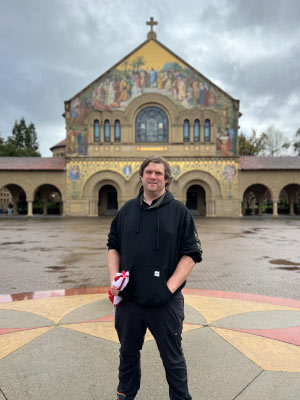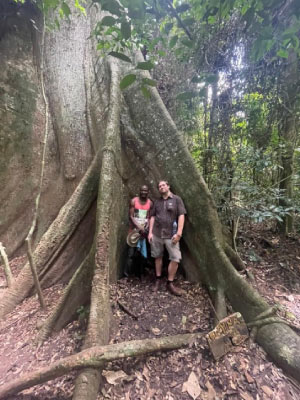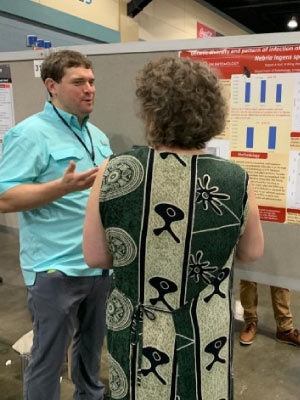
When Rob Hall accepts his offer to attend Stanford University as a PhD candidate in their Cell, Molecular and Organismal Biology program, it will be exactly two years after he almost gave up on academics altogether.
Hall started his academic journey in an atypical setting. A few mistakes led to nonviolent convictions, and Hall became incarcerated. Scared of what to expect, he reached out to his online community. “I’d never met these people, but I told them that I was going to jail, and I was scared,” Hall remembers. “Somebody said, ‘Well, you’re going to need a reading list.’ And they gave me a reading list of philosophy, psychology, evolutionary biology, political science … all these different things.”
While incarcerated, Hall worked his way through the list. He read Richard Dawkins’ The Selfish Gene. He read Steven Pinker, an evolutionary psychologist, and he read E.O. Wilson, a biologist. He read Russian, European, and American literature. Shortly after release, he enrolled at UW–Waukesha. He made the Dean’s List, the honor’s program, and earned his associate degree summa cum laude.
Hall then transferred to UW–Madison — a school that’s 98 percent larger than Waukesha. “I lost a lot of that network,” he says. “It felt like the floor just dropped out beneath me.” Frustrated, Hall left. “It wasn’t soul searching or anything. I was just falling into bad habits,” he reflects. “I got out of that though, and I decided to re-enter.” When he left, he was majoring in genetics. When he came back, he added a second major — history — and an environmental studies certificate through the Nelson Institute’s Community and Environmental Scholars Program. He is also a McNair Scholar and works in the Molecular Ecology Lab run by the Nelson Institute’s Sean Schoville, who has become one of Hall’s strongest mentors.

Though Hall’s path to UW–Madison has been winding, his trajectory since arriving has been a straight shot upward. He jumped back in, taking full-credit semesters and getting As across the board. One of the first classes he took was Genetics 527 with Francisco Pelegri, genetics department chair and professor. “He was using developmental genetics to enhance dwindling populations within the wild,” Hall explains. The idea is to collect tissue samples from species — both threatened and thriving — and cryogenically preserve them through a process called biobanking. Then, in case of future threats or extinction, those species could be reintroduced. This has already been achieved with the reintroduction of the black-footed ferret, the first North American native, endangered species to be cloned. The Nelson Institute is also working in this space through its Global Ark Project, led by Dean Paul Robbins with collaboration by Pelegri.
This spring break, alongside Pelegri and 14 other UW students, Hall traveled to Costa Rica to put some of this biobanking work into practice. Hall’s team focused on the paca — a small, nocturnal rodent that has recently become overhunted, but isn’t yet endangered. “If we were to do biobanking,” Hall explains, “we could feasibly reintroduce them to Costa Rica because, one, their habitat still exists there, and two, they belong there.
With Pelegri, Hall also designed a proposal using zebrafish cell cultures to identify pluripotent factors, or small pieces of genetic material — a proposal that won him the Diversification of our Research Scientists (DOORS) Scholarship from Promega, a biotech company based in Madison.
Now it’s May 2023, and Hall is ready to graduate. Since returning to — and thriving in — academia, Hall works to help other formerly incarcerated folks pursue paths to higher education. “When I re-entered, I made it a personal thing,” he says. “I had come to school to be an intelligent scientist, but also to help communities of people like me who are disadvantaged in life.”

With help from the Wisconsin Idea Fellowship and the Cyrena Pondrom Leadership Award, Hall created Liberated Intellects, a program designed to reduce recidivism and open educational pathways by helping formerly incarcerated people apply to college. His idea was to bring together formerly incarcerated people for a weekly meal and discussion on higher education pathways, but Hall is expanding the concept to include a more holistic, critical eye on the systems that lead to incarceration and recidivism.
Though Liberated Intellects started at UW–Madison, Hall plans to bring the work with him to California. “Somehow as a biologist, I will continue talking about that stuff,” Hall says. “There’s no way that I can go forward and not talk about how important these things are and my views on them.” So far, Hall has only been able to help a few with Liberated Intellects. But if you’ve been paying attention, you’ll know that Hall doesn’t give up easily.